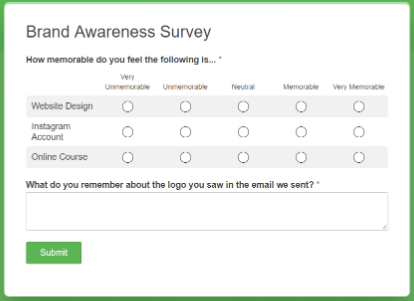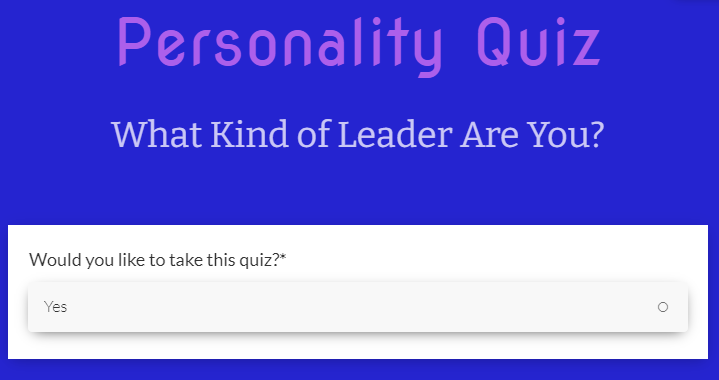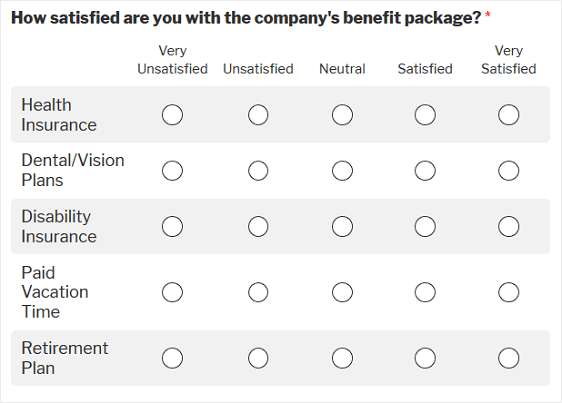There’s nothing more crucial than the opinions and demands of the masses when it comes to the survival of a business. Without their recognition and buy-in, it’s really hard, or not to say impossible to get your products, services, or marketing strategies off the ground.
In terms of getting opinions, surveys still stay unbeatable despite the rapid growth of advanced behavioral analytics systems. They serve as a key in gathering and compiling customer information. This helps provide data insight and enhance your offerings. From that point, you can easily gain an edge within your niche and outperform your competitors.
In this article, we’ll take you through different salient types of surveys and dig deep into the benefits they bring to your business.
At the end of this article, you’ll know:
- Types of Survey Techniques
- #1 Market Research Surveys
- #2 Customer Satisfaction Surveys
- #3 Brand Awareness Surveys
- #4 Lead Generation Surveys
- #5 Job/Employee Satisfaction Surveys
- #6 Exit Interview Surveys
- #7 Meeting/Event Evaluation Surveys
Types of Survey Techniques
Talking about survey techniques, basically, they are categorized into 2 common types: questionnaires and interviews.
Questionnaires
Normally, a questionnaire usually appears in a close-ended question form, followed by response options. It can be designed in an old-school style, which is a paper-pencil instrument. Or you can see it in digital format as an online survey nowadays.
Pros:
- Best- suited for close-ended questions.
- Ideal for consumer or market research.
Cons:
- Limits survey takers on the number of given options. This refrains survey conductors from thoroughly understanding the respondent’s answers.
Interviews
On the other hand, interviews let your participants provide more personal answers. The second technique eliminates the downside of questionnaires, letting you get insight into their answers by offering open-ended questions.
There are several popular interview methods, including face-to-face, phone, and online interviews.
Pros:
- Give researchers the opportunity to ask follow-up questions and understand their participants better.
Cons:
- Time-consuming.
- Need to have personal information, such as the phone numbers of the target respondents to organize the interview.
Since you’ve known 2 types of survey approaches, it’s time to discover 7 salient types of surveys to facilitate your business growth. Please note that in this article, we focus on the questionnaires only.
#1. Market Research Surveys
Do you want to discover what your customers need?
What is customer interaction and feedback toward your sample products? These questions can be answered directly via market research surveys.
Whether your business is in its initial stage, expanding, or already established, market research matters a lot in keeping you stay ahead of competitors.
Market research surveys deliver a detailed and accurate insight into what your consumers think about your products and services. At that point, you can identify the weakness and strengths of your products, tailor a marketing campaign for quality leads and outburst conversions.
Plus, conducting these types of surveys also gives you an opportunity to analyze your key players and their marketing approaches. As a result, you’re able to find the gaps in their strategies, which then can turn into your advantages in remodeling your future plans.
What you need to keep in mind when carrying out these types of surveys:
- Be specific in asking customer’s opinions or needs toward a certain product/service.
- List out what features or aspects of your products (prices, quality, design,…) that impress customers.
#2. Customer Satisfaction Surveys
Customer satisfaction surveys aim to evaluate the pleasure levels of customers about various aspects of your businesses, including products, services, or your approach to the market.
The survey results after you analyze the data can be implemented not only in the new products or services but also in brand identity or company policy.
To launch a successful customer survey campaign, you need to pay attention to survey questions and design. A poorly designed and cursory survey will waste your time, money, and resources. On top of that, it can leave a bad impression on the company image.
Considering asking the right questions can lead to higher customer retention, below are several suggested queries for this type of survey:
- How would you rate your overall happiness with us?
- Would you likely recommend our products/services to your friends/relatives?
- How would you rate your shopping experience/our customer services?
- Do you have anything to add?

#3. Brand Awareness Surveys
Brand awareness serves as the lifeblood of a company. Think about any products in your daily life. A laptop. A shirt. A wallet. In all cases, a specific brand name for each item will certainly cross your mind.
Knowing what customers think about your brands will help measure your brand recognition, improve brand power, determine your brand attributes, and understand customer loyalty.
However, according to a research of Monkey Survey, although 80% of their respondents realize the absolute importance of brand awareness, up to 76% have no idea about what percentage of their target market is aware of their brand.
It’s when brand awareness surveys come to play!
To carry out a successful brand awareness survey, there are some main metrics that you should remember by heart:
- Brand recognition shows how well users perceive and realize your brand.
- Brand image points out how customers associate with your brand.
- Brand identity gauges consumer opinions about every aspect of your brand, including branding logo, color, and design.
- Brand recall measures how fast consumers remember your brand in their memory.
- Brand trust indicates how trustworthy your brand is to people.
- Brand loyalty discovers whether customers will return to buy your products or services again. This is the determining factor to your business growth.

#4. Lead Generation Surveys
Another essential survey for business is the lead generation survey. This powerful type of survey assists you in gathering information about your leads, such as contact info and preferences.
An ideal lead generation survey must support you to leverage and segment your leads, by tracking down which products or services they’re interested in. Plus, it also gives you permission to reach out to new prospects when they opted in to your surveys.
Normally lead generation surveys are sent out via emails. Remember that your final goal is getting lead info, so ensure to keep your survey short and to the point. Below are some pro tips to make your lead generation survey beyond better:
- Focus on the most important information such as email addresses and names. Other details can be asked later.
- Make sure to use opt-in forms so that users can share emails with others.
- Engage users and make the game more fun via playful quizzes instead of a regular (not to say boring) survey.

#5. Job/Employee Satisfaction Surveys
These types of surveys help business owners to find out how happy or satisfied their employees are with their job and working environment. Positive feedback equals bright signs for higher employee engagement and stronger team bonds.
It’s believed that monitoring job satisfaction wields a strong influence on employee morale. Organizations having satisfied and engaged employees outperform those which don’t by 200%.
So how can the data job/employee satisfaction surveys grow your business?
- Give a clear picture of how your employees feel and collaborate with the team.
- Enable you to come up with actionable improvement targets for particular employees.
- Sketch out where additional training or instruction is needed.
- Reveal which working aspect needs improvement.
Focus on these questions when crafting these types of surveys:
- How proud are you to work for your company?
- How many times a week do you feel stressed at work?
- Do you feel valued?
- How meaningful is your work to you?

#6. Exit Interview Surveys
This type of survey allows you to l find out the reason behind why your valued employees choose to quit their jobs. They can be a lack of physical and financial motivation, conflicts with colleagues or managers, no promotional prospect, tight working schedule, or boring working environment.
A high turnover of staff can cause your profit to plunge. Therefore, an exit interview survey will help you remove the pain points by giving you some ideas for improvement and keep your staff around. At that point, reducing turnover will lead to high productivity.
By surveying regularly, you take a step closer to your employee’s desires. However, the questions you include in the survey carry weight in encouraging respondents to voice their opinions.
Take the questions below as a reference when creating an exit interview survey:
- What’re your reasons to leave the company?
- What makes you look into a new job?
- What could have been done to get you continued working here?
- Did you voice your concern or seek help from co-workers or managers before leaving?
- Were you given enough training about your job?
- If you could change 3 things about your job, what would they be?
- What did you enjoy most and least about this job?
- Does the company stick to its creeds and missions?
- Did you ever feel bullied and separated in a way?
- Is there anything else you would like to add?
#7. Meeting/Event Evaluation Surveys
Meeting or event evaluation surveys refer to questionnaires that strive to collect feedback from attendees, which can be designed in open-ended questions and multiple-choices.
You can send out these types of surveys before, during, and after events. Among them, pre-event and post-event feedback significantly determines the quality of survey results. Though not all feedback is good, even some negative ones get under your skin, it’s vital for shaping and optimizing your event strategies.
By pairing the survey insight with your event KPIs, you can conclude how successful your event was and how you can improve it in the future.
The event survey questions below will give you some inspirations:
- How satisfied were you with the events/meetings?
- What did you like most/least about the events/meetings?
- How likely are you to attend one of our events in the future?
- How likely are you to recommend our events to a friend?
- Is there anything else you would like us to know?
- Please indicate your satisfaction with the following aspects of the event: venue/ event platform, speakers, quality of sessions, amount of sessions offered, date(s) of event, etc.
Utilizing Surveys to Improve Your Business Now!
As you can see, surveys enable you to stay connected and give better understandings of your consumer preferences and needs. This versatile tool helps you pretty much in anything, from market research, brand awareness, lead generation to customer/job satisfaction, exit interview and tons more.
Different surveys serve different purposes and target various audiences. However, the main goal is no other than assisting you to customize your specific needs. Keep in mind that, no matter what types of surveys you’re using or how regularly you conduct them, it will cut no ice with your business if you fail in analyzing the survey data and accordingly implementing them.
Which types of surveys have you tried so far? We’d love to hear about your experience in the comment section below!